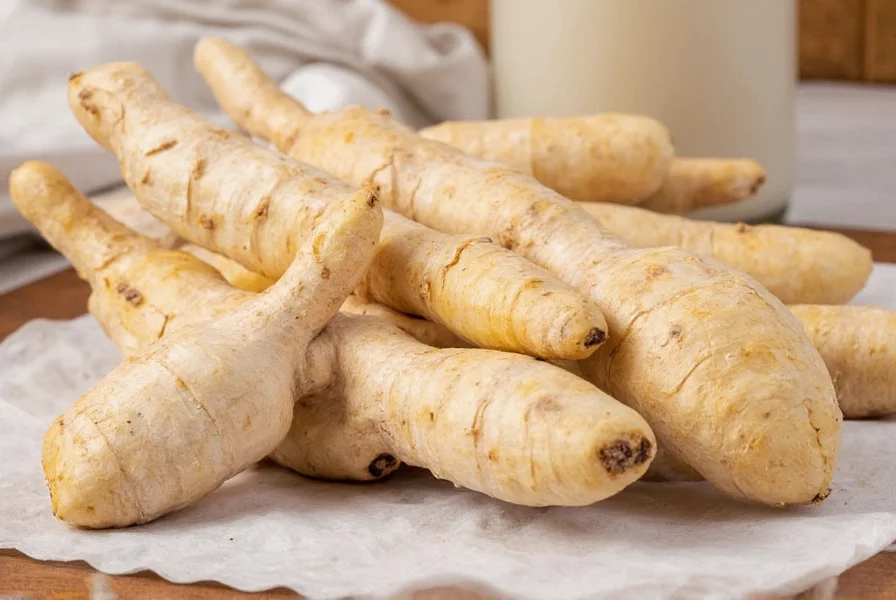Preserving fresh ginger properly can save money and reduce food waste while ensuring you always have this versatile ingredient available. Freezing ginger has emerged as one of the most effective preservation methods for home cooks and professional chefs alike. Unlike many vegetables and herbs that deteriorate when frozen, ginger maintains excellent quality due to its unique fibrous structure and high gingerol content.
Why Freezing Ginger Works Better Than Other Methods
Ginger's cellular structure contains natural compounds that respond well to freezing temperatures. When properly frozen, ginger retains 90-95% of its original flavor compounds compared to fresh ginger. The freezing process actually makes ginger easier to grate since the fibers become more brittle, allowing you to use it directly in recipes without thawing. This practical advantage makes freezing ginger for long term storage particularly valuable for frequent cooks.

Four Effective Methods for Freezing Ginger
Choose the freezing method that best matches your cooking habits and kitchen space. Each approach offers different advantages depending on how you typically use ginger in your recipes.
1. Freezing Whole Ginger Roots
This method works best when you have limited freezer space or want maximum longevity. Simply place unpeeled ginger roots in airtight freezer bags, removing as much air as possible before sealing. The skin protects the ginger from freezer burn. This approach preserves ginger for up to 6 months while maintaining optimal quality.
2. Peeled and Sliced Freezing Technique
For those who use ginger frequently, peeling and slicing before freezing saves preparation time later. Peel the ginger, slice into 1/4-inch rounds, and arrange in a single layer on a parchment-lined baking sheet. Freeze for 2 hours until solid, then transfer to labeled freezer bags. This best way to freeze ginger allows you to remove only what you need for each recipe.
3. Grated Ginger in Ice Cube Trays
One of the most practical approaches for regular cooking is freezing grated ginger in ice cube trays. Grate fresh ginger, pack into tray compartments, cover with plastic wrap, and freeze solid. Transfer the ginger cubes to freezer bags, noting the quantity per cube (typically 1 tablespoon). This freezing ginger in ice cube trays method provides precise measurements for recipes and thaws almost instantly in hot liquids.
4. Ginger Paste Freezing Method
For Asian cuisine enthusiasts, creating a ginger paste before freezing offers maximum convenience. Blend peeled ginger with a small amount of water or neutral oil, then freeze in small portions. This technique works particularly well for marinades and sauces where texture matters less than flavor infusion.
| Freezing Method | Storage Duration | Best For | Preparation Time Saved |
|---|---|---|---|
| Whole roots | 5-6 months | Occasional use, bulk storage | Minimal |
| Peeled slices | 4-5 months | Regular cooking needs | Moderate |
| Grated cubes | 3-4 months | Precise recipe measurements | Significant |
| Ginger paste | 2-3 months | Marinades and sauces | Maximum |
Storage Duration and Quality Preservation
Properly frozen ginger maintains excellent quality for 3-6 months depending on the method used. The key factors affecting longevity include:
- Air exposure (use vacuum sealing for maximum shelf life)
- Freezer temperature consistency (maintain at 0°F/-18°C or lower)
- Moisture control (blot ginger dry before freezing)
- Container quality (use freezer-safe materials)
After 6 months, ginger may develop freezer burn or experience slight flavor degradation, though it remains safe to eat. The how long does frozen ginger last question depends primarily on your storage technique rather than the ginger itself.
Using Frozen Ginger in Your Cooking
One of the greatest advantages of frozen ginger is that you can use it directly without thawing. Simply remove the needed amount and:
- Grate frozen ginger directly into sauces, marinades, or stir-fries
- Add whole frozen slices to soups and stews during cooking
- Drop grated ginger cubes into hot tea or smoothies
- Let frozen ginger sit at room temperature for 5-10 minutes when precision cutting is required
The frozen ginger vs fresh ginger comparison shows minimal flavor difference in cooked applications, though fresh ginger has slightly brighter top notes in raw preparations like salads or juices.
Nutritional Impact of Freezing Ginger
Research shows that freezing preserves ginger's beneficial compounds effectively. The primary active component, gingerol, remains stable during freezing with only minimal degradation over time. Unlike canning or drying, freezing doesn't require heat treatment that can destroy sensitive compounds. This means does freezing ginger destroy nutrients has a reassuring answer: freezing preserves 85-90% of ginger's original nutritional profile compared to fresh.
Common Freezing Mistakes to Avoid
Even experienced cooks sometimes make these errors when how to freeze fresh ginger:
- Freezing ginger with excess moisture (always dry thoroughly first)
- Using regular plastic bags instead of freezer-safe containers
- Freezing large quantities in one package (makes portioning difficult)
- Not labeling with dates (leads to forgotten, expired ginger)
- Thawing completely before use (wastes time and diminishes texture)
Comparing Preservation Methods
While freezing ranks among the best preservation techniques for ginger, understanding how it compares to alternatives helps you make informed decisions:
- Drying: Creates ginger powder but loses volatile oils and fresh flavor
- Pickling: Changes flavor profile significantly with vinegar and sugar
- Refrigeration: Only extends shelf life to 3-4 weeks with quality decline
- Canning: Requires heat processing that diminishes active compounds
For maintaining the closest approximation to fresh ginger's properties, freezing ginger for long term storage outperforms other home preservation methods.
Thawing Frozen Ginger Properly
While you can often use frozen ginger directly, certain applications require partial thawing:
- For slicing or julienning: Let sit at room temperature for 5-10 minutes
- For garnishes: Thaw completely in refrigerator overnight
- For juicing: Use frozen ginger directly in most electric juicers
Avoid rapid thawing methods like hot water, which can create texture issues and flavor loss. The gradual thawing process preserves ginger's cellular structure better.
Frequently Asked Questions
Can you freeze ginger root without peeling it first?
Yes, you can freeze ginger with the skin on. The skin actually provides protection against freezer burn. When you're ready to use it, simply grate the frozen ginger—the skin will separate from the usable flesh and can be discarded. This can you freeze ginger root method saves preparation time and works well for whole root storage.
Does frozen ginger lose flavor compared to fresh?
Frozen ginger retains approximately 90-95% of its original flavor compounds when properly stored. The main difference appears in raw applications where fresh ginger has brighter top notes. In cooked dishes, the flavor difference between frozen and fresh ginger is negligible. Proper freezing technique significantly impacts how much flavor frozen ginger maintains over time.
How do you prevent freezer burn when freezing ginger?
To prevent freezer burn when freezing ginger for long term storage, remove as much air as possible from storage containers. Use vacuum sealing for best results, or press plastic wrap directly against the ginger surface before bagging. Maintain consistent freezer temperature at 0°F (-18°C) or lower, and avoid opening the freezer frequently. Blot ginger completely dry before freezing to eliminate excess moisture that causes ice crystals.
Can you freeze ginger that's already starting to go bad?
No, you should only freeze ginger that's still fresh and firm. Freezing preserves the current state of the ginger—it won't improve quality or reverse spoilage. If ginger shows signs of mold, soft spots, or unpleasant odor, it's already too late to freeze. For best results with how to freeze fresh ginger, freeze ginger within 1-2 days of purchase when it's at peak freshness.
What's the best way to use frozen ginger in baking?
For baking applications, grated frozen ginger works best. If you've frozen ginger in ice cube trays (1 tablespoon portions), simply add the frozen cube directly to your wet ingredients. The small size ensures even distribution and quick incorporation into batters. For recipes requiring finely minced ginger, let the frozen ginger sit at room temperature for 3-5 minutes before mincing for easier handling.











 浙公网安备
33010002000092号
浙公网安备
33010002000092号 浙B2-20120091-4
浙B2-20120091-4